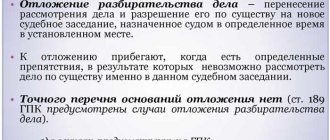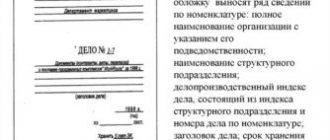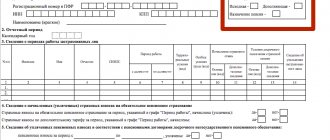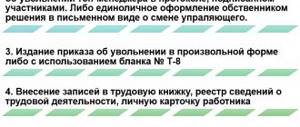The process of familiarization with the case in arbitration
The procedure for familiarizing yourself with a case in the Arbitration Court is the process of studying materials and documents that help determine the subject of the dispute and the evidence base. Both parties have the opportunity to analyze the information received, which will be needed when building a defensive strategy in court.
Reasons for the need to study the case materials:
- The party to the dispute has received a judicial act on involvement in the case, but has not yet become familiar with the conflict.
- A third party, witness, expert or lawyer enters into the case, but does not yet know about the subject of the dispute and past court hearings.
- The introduction into the case of new evidence or documents that have not yet been considered by the participants in the proceedings.
When studying the case, it is recommended to rely on the federal law “On Arbitration Courts in the Russian Federation” and on the Arbitration Procedural Code . Also, the specifics of familiarizing yourself with the case materials are indicated in the instructions for paperwork in the arbitration courts of the Russian Federation.
Procedure for reviewing materials
Materials must be issued in one volume
A properly completed application (in two copies) must be submitted to the office of the judicial authority; the second copy remaining in the applicant’s hands must be marked with the date the office accepted the document and the entry number assigned to it.
Also, the application can be submitted directly to the assistant judge considering the case. Upon receipt of the said application, the court staff will either immediately provide the applicant with the file for review, or will appoint a specific day and time for this.
In accordance with the provisions of the special Instructions for judicial records management in a general jurisdictional district court, familiarization with the materials contained in the court case is carried out in a specially equipped room for this purpose in the direct presence of a specially authorized court employee, as well as in conditions that categorically exclude the possibility of seizure, damage, as well as destruction of materials contained in the court case.
In accordance with the above rules, on the day appointed for familiarization, the applicant is sent to a special room, where, upon presentation of a document that verifies his identity and procedural status, he receives the requested materials from an authorized court employee.
Having received the file, the subject can begin to study it, make extracts from it, photograph and copy any necessary materials without taking them outside the premises. The time allotted for familiarization is not specifically limited, however, it may be interrupted during the lunch break of court employees and the end of their working day.
If the materials contained in a court case consisting of a large number of volumes are being studied, then, as a rule, a special familiarization schedule is drawn up, indicating specific dates and the number of volumes issued to the subject for review on each day.
This is interesting: The difference between robbery and robbery
This schedule is agreed upon with the persons responsible for providing the materials contained in the case. Direct issuance of materials included in a multi-volume file is carried out sequentially, one volume at a time.
After familiarization with the materials contained in the court case is completed, an entry is made in the reference sheet of the latter or on the back cover of the cover “I have read the materials of the case No.”, the full name and procedural position of the subject is indicated, his handwritten signature and the date of familiarization with the case are placed .
If the subject who filed an application to familiarize himself with the materials contained in the court case did not appear on the appointed day, further familiarization with the case materials can only be carried out on the basis of a newly submitted application.
How to obtain case materials for study
The right to familiarize yourself with the case materials in the Court of Justice is available to all participants in the trial.
You can file a petition after the claim is accepted for proceedings and the judge approves the corresponding ruling. Before this, the case is considered not to have been opened, therefore there are no materials for study.
Familiarization with documents is carried out in the arbitration court by appointment . A written statement or petitions from the person who applies to the AS UR is prepared in advance. The document is drawn up in accordance with the example provided by the judge's secretary. The application may also be written in free form.
Evgeniy Baidalin
Arbitration lawyer. More than 10 years of experience
Ask a Question
The main thing is to provide all the necessary information.
Rules for filling out an application
The application must disclose the purpose of familiarization with the case materials. Documents confirming the authority of the applicant may be attached to the application. It is not necessary to put a date on the application.
List of application details:
- Full name of the court.
- Information about the applicant (it is important to indicate the full name and status of the person in legal proceedings).
- Information about the case - its number, the name of the judge who considered the proceedings.
- Date and number of the power of attorney, if available.
- Contact details and place of residence of the applicant.
- Signature.
If any details are not indicated in the application, the judge is still obliged to consider the application.
Sample request for familiarization with the materials of the arbitration case
To the Arbitration Court of the Udmurt Republic
UR, Izhevsk, st. Lomonosova, 5
Plaintiff : ______________________________ Taxpayer Identification Number____________________
OGRN____________________ address: ___________________ tel. _____________________ e-mail: _________________
Defendant: _____________________________
Taxpayer Identification Number____________________
OGRN____________________ address: ___________________ tel. _____________________ e-mail: _________________
Representative of the Plaintiff: _________________________
address: ___________________ tel. _____________________ e-mail: _________________
Case No. A71-_____/20__
Petition
about familiarization with the case materials
The Arbitration Court of the Udmurt Republic (hereinafter referred to as the Arbitration Court of the Udmurt Republic) is considering case No. A71-__________ about _________________________.
In accordance with Art. 41 of the Arbitration Procedural Code of the Russian Federation, persons participating in the case have the right to familiarize themselves with the case materials.
I request to familiarize myself with the materials of case No. A71-_________.
Application:
1. Power of attorney for a representative - (copy).
Attorney-in-fact
Plaintiff (Defendant) ______________
Our arbitration lawyers can help you draw up a Request to familiarize yourself with the materials of your case right now at the cost indicated in the Price List. To do this, you need to call or simply leave a request on the website.
The right to familiarize yourself with the case materials
According to Part 2 of Art. 24 of the Constitution of the Russian Federation “Bodies of state power. are obliged to provide everyone with the opportunity to familiarize themselves with documents and materials that directly affect their rights and freedoms, unless otherwise provided by law.” A continuation of this constitutional guarantee is Art. 35 of the Code of Civil Procedure of the Russian Federation, according to which persons participating in the case have the right to familiarize themselves with the case materials, make extracts from them, make copies, file challenges, present evidence and participate in their study, ask questions to other persons participating in the case, witnesses, experts and specialists; file petitions, including requests for evidence; give explanations to the court orally and in writing; present your arguments on all issues arising during the trial, object to the requests and arguments of other persons participating in the case; appeal court decisions and use other procedural rights provided by the legislation on civil proceedings. Persons participating in the case must conscientiously use all their procedural rights.
Persons participating in the case have the right to familiarize themselves with the materials of the case. This can be done both in the courtroom (before the hearing of the case on the merits) and during the commencement of the trial in the courtroom (after the report of the case). The duty of the court is to create the necessary conditions for familiarization with the case materials - to provide the materials themselves (time for familiarization), a room, a table and a chair. In relation to some persons participating in the case, the court is obliged to take specific actions that will facilitate the exercise of their rights to familiarize themselves with the case materials. For example, one of the guarantees of adversarial civil proceedings and equality of the parties before the law and the court is the obligation of the court to send or hand over to the defendant a copy of the statement of claim (so that the defendant has the opportunity to prepare for pre-trial and court hearings).
Persons participating in the case have the right to make extracts from the case materials. The volume of extracts is determined by the person participating in the case. Extracts can be made from any materials, and not just from those that directly relate to a given person. The legality of this rule is explained by the fact that during a court hearing, materials that at first glance do not have a significant relation to the person, when examined as evidence and during the speech of the opposing party, can turn against him. Let us clarify two points. First: if a person were prohibited from familiarizing himself with such materials and making extracts from them, he would not be ready to refute them in a civil trial, which means that the process would be deprived of the principle of adversarialism and equality of parties. Second: if procedural rules established such restrictions, it is not clear who and, most importantly, based on what considerations, could determine which materials directly concern a person and which do not. It seems that these arguments clearly demonstrate the legitimacy of the current norm.
This is interesting: Who owns the land under an apartment building
Persons participating in the case have the right to make copies of the case materials. Copies can be made either by hand or by photocopying (if technically possible) or by photographing. This right is an important guarantee of the adversarial nature of the trial, since it allows the parties to thoroughly prepare for the hearing (in particular, prepare the evidence base), which, I think, will contribute to the adoption of a lawful decision.
Methods for filing an application
Applications are accepted on working days in the arbitration court. The petition can be submitted by mail or electronically using the My Arbitrator service . It is also possible to submit a document through the office, having previously made an appointment by telephone with the court secretary, specialist or assistant judge.
There are no exact statistics on how applications are most often submitted. But many arbitration representatives claim that the majority are personally referred through the office.
Sending an application by mail
Filing a request for discovery by mail is the worst choice . Other documents can be safely submitted in this way, but the application to familiarize yourself with the case materials has a limited time limit. So the time when information about the proceedings is provided comes 5 days after the application is accepted.
When submitting documents by mail, it is impossible to determine the deadline for acceptance of the application. The date of receipt of the parcel and registration of the application may differ. If you can find out about the receipt of a postal item remotely on the Russian Post website, then it is impossible to determine the second date online.
In this situation, it is easy to miss the day of issuing the case materials. Then you will have to negotiate directly with the assistant judge so that he will release information about the proceedings after the deadline. But the arbitration court employee is not always cooperative, so you need to re-submit the application and again wait 5 days.
When delivering by post, other risks should be taken into account - documents may simply get lost without ever reaching the recipient. Also, the parcel may be delayed on the way. As a result, it is not possible to study the case materials in a timely manner, which negatively affects the further course of legal proceedings.
It is recommended to send time-limited documents by mail only as a last resort, when it is not possible to come to the office in person or fill out an online application.
Sending documents in electronic format
The electronic application is filled out through the My Arbitrator website, which can be found on the portal www.my.abitr.ru. It is required to send scanned documents in pdf format. The method is fast and convenient, but it has certain limitations.
In what cases is it prohibited to use the electronic method:
- hard to read papers;
- a large number of documents requiring forwarding;
- technical limitations (presence of firmware that cannot be removed);
- lack of scanned copies or Internet access.
For filing an application that only takes one page, the electronic version is ideal. The “My Arbitrator” system describes in detail the features of using the remote method. Everyone will be able to understand the electronic form thanks to the instructions provided.
Step 1
Step 2
Step 3
Step 4
Step 5
Step 6
Online service “My Arbitrator”
Personal visit to the office to submit an application
A petition is additional paper that is used when considering a case in an arbitration court. When submitting documents, there are two queues at the office. One submits an application with verification of applications, the other submits an application without checking applications.
For each queue, several windows open where arbitration court employees accept papers. But not all windows function at the same time; office workers often need to leave for various reasons.
When are case materials released?
After submitting the documents, the applicant receives a corresponding mark. All that remains is to wait for the deadline for issuing the case materials. It is important not to miss this date. All information about the trial can be obtained 5 business days after receiving the petition. The countdown begins the next day.
This period is determined by the need for AS SD employees to put things in proper order. Within 5 working days, judicial assistants must complete the firmware, inventory, and volume numbering. This process takes a long time, but otherwise, according to the law, the case materials are not provided for consideration.
The applicant will learn about the readiness of the case for consideration by telephone or email from an office employee. The date and place of study of the case materials are prescribed by the assistant judge on the application itself, after which he puts his signature.
Evgeniy Baidalin
Arbitration lawyer. More than 10 years of experience
Ask a Question
The date is subject to change and applicants will be notified in advance. In some cases, the materials of the proceedings are issued on the day the request is submitted (for example, the arrival of a representative from abroad).
If the applicant is overdue, you can try to negotiate with the assistant judge. If he refuses to issue the dispute materials, you will have to re-submit the petition, so it is important to calculate all the deadlines in advance so as not to miss your turn.
If for any reason the applicant was unable to come to the arbitration court on the appointed day, then he must contact the assistant judge to resolve this problem. At the stage of late application, you can still agree to receive the case materials. If a person has not filed a petition at all, then no one will give him information about the trial.
To familiarize yourself with the case materials, you do not need to additionally agree on an appointment time. It is enough to come to the court during the hours when information about the proceedings is released for study.
Operating hours of the UR AS office for receiving additional documents
From Monday to Thursday, applications are accepted from 9 a.m. to 4 p.m. On Friday and before holidays from 9 a.m. to 3 p.m. Every day from 12 to 13 there is a break.
To submit documents through the office, you must come with a passport or other identification document. To submit an application, you must join a queue where documents without attachments are accepted. But in fact, the applicant’s papers will be accepted at any cash desk.
Case review hours
Familiarization is carried out exclusively on weekdays. From Monday to Friday, case materials are available from 9 a.m. to 5 p.m. On Fridays and before holidays the office is open only until 16:00.
The examination is carried out in the presence of an employee of the arbitration court. If in the application the citizen indicated the need to obtain photographs of documents, then it is allowed to photograph them with a smartphone or camera.
If there are classified materials in the case, then familiarization is carried out only in the presence of a representative of the court (bailiff for ensuring order) vested with the appropriate powers. If one day is not enough to study all the papers, then you are allowed to come the next business day and continue reviewing without first submitting an application.
There are usually cameras installed in the room where case materials are studied. Also, if necessary, a bailiff may be present during the inspection. After studying the papers, the applicant puts his signature on the familiarization sheet and also indicates his last name and initials.









